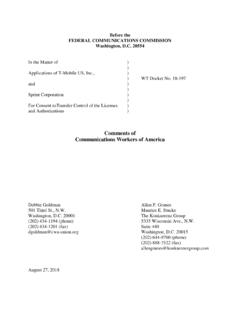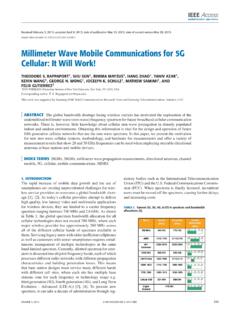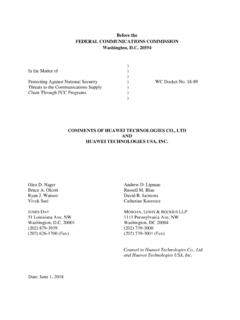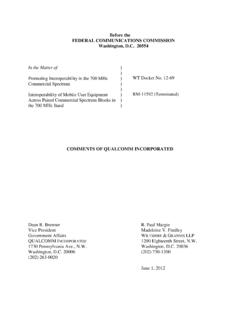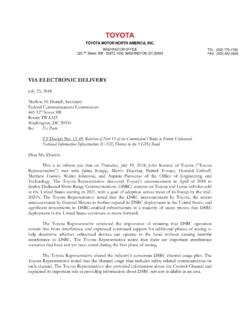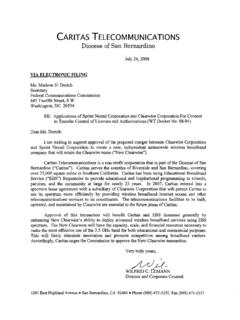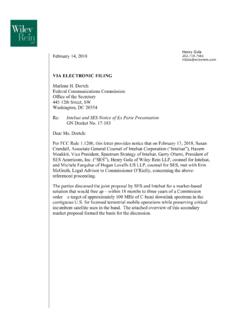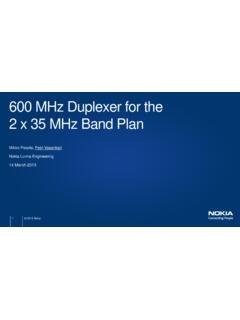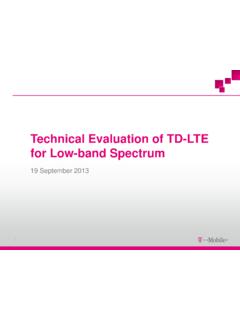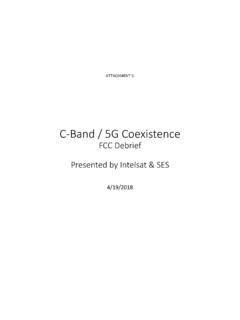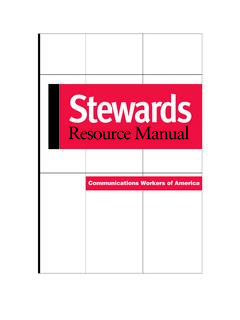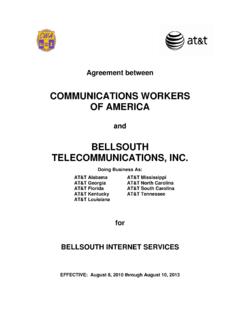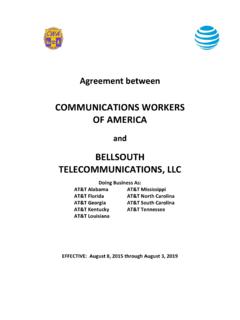Transcription of RE: In the Matter of Accelerating Wireless Broadband ...
1 September 18, 2018 Ms. Marlene H. Dortch Secretary Federal Communications Commission 445 Twelfth Street, SW Washington, DC 20554 RE: In the Matter of Accelerating Wireless Broadband Deployment by Removing Barriers to Infrastructure Investment, WT Docket No 17-79; Accelerating Wireless Broadband Deployment by Removing Barriers to Infrastructure Investment, WC Docket No 17-84. Dear Ms. Dortch: As the Communications Workers of america s (CWA) representative on the Broadband Deployment Advisory Committee (BDAC) s Model Code for Municipalities Working Group, I write to express serious concern with the Federal Communications Commission s (FCC or Commission) draft Declaratory Ruling and Third Report and Order,1 which is inconsistent with recommendations from the BDAC Model Code for Municipalities Working Group2 and, moreover, is an overreach of federal authority. This draft Order oversteps the BDAC recommendations that I voted for.
2 The draft Order, in addition to restricting the power and authority of local governments, is inconsistent with the BDAC Model Code for Municipalities Working Group s guiding principles and numerous recommendations,3 curbs the efforts of local governments to close the digital divide an issue Chairman Pai described as one of our core priorities going forward in his first speech as Chairman4 and undercuts the BDAC process by ignoring the views of critical stakeholders. The draft Order s proposed fee levels are unreasonable and will harm local policy innovation. The fee levels in the draft Declaratory Ruling and Third Report and Order are inconsistent with BDAC s Model Code for Municipalities recommendations both in substance and in principle. The draft Order sets presumptively reasonable costs at $270 per year per It is important to note that the BDAC s 1 In the Matter of Accelerating Wireless Broadband Deployment by Removing Barriers to Infrastructure Investment, Declaratory Ruling and Third Report and Order, WT Docket No.
3 17-79; Accelerating Wireless Broadband Deployment by Removing Barriers to Infrastructure Investment, Declaratory Ruling and Third Report and Order, WC Docket No 17-84 (rel. Sept. 5, 2018). (Draft Order) 2 Broadband Deployment Advisory Committee (BDAC) Model Code for Municipalities (approved July 26, 2018). Available at: 3 Ibid., Appendix A. 4 Remarks of Chairman Ajit Pai to FCC Staff (Jan. 2017). Available at: 5 Draft Order, p. 37. 2 Model Code for Municipalities Working Group did not issue a conclusion on fee levels due to lack of Moreover, the seventh guiding principle of the BDAC s Model Code for Municipalities Working Group which was adopted by the full BDAC reads: Recognize the need [of municipalities] to allocate resources to digital inclusion and innovative business models to drive Broadband adoption and close digital divides. 7 (The Model Code s Appendix A and Appendix A-1 are attached to this letter.)
4 However, as the draft Order states (emphasis added): Fees that cannot ultimately be shown by a state or locality to be a reasonable approximation of their costs, such as high fees to subsidize local government costs in another geographic area or accomplish some public policy objective beyond the providers use of the [rights-of-way] are not fair and reasonable 8 This proposed ruling is clearly inconsistent with the BDAC Working Group s seventh guiding principle. More importantly, it will foreclose the ability of municipalities to reach agreement with service providers to provide funding to local programs working to close the digital divide. The result will be a persistent digital divide and communities left behind. The Commission s aesthetic controls are flawed. The draft Order restricts local aesthetic requirements and historical Local authorities establish aesthetic and historical review standards based on input from their residents to address concerns unique to their communities.
5 These locally developed guidelines have a direct bearing on a city s quality of life, its economic development, historic preservation, property values, tax levels, and jobs. Federal standards cannot address the unique concerns of every community in america . The Commission s aesthetic controls effectively remove public input from citizens and taxpayers and grant power to an unelected federal agency. In addition, the draft Order also defines the size of Small Wireless Facilities, including that all antenna equipment associated with the facility (excluding antennas) can be up two 28 cubic feet in Here again, the BDAC Model Code for Municipalities Working Group did not issue a conclusion regarding the definitions of Small Wireless Facility due to lack of The Commission ignores the work of the Broadband Deployment Advisory Committee. Members of the BDAC s Model Code for Municipalities worked for over a year in good faith to develop recommendations for model municipal codes.
6 I put in hundreds of hours in conference calls, review of dozens of working drafts, and background research as our Working Group aimed to develop consensus on a Model Code that carefully balanced the interests of all stakeholders including the interests of low- and moderate- income working class households that I aimed to represent. The goal of the BDAC was to recommend ways to facilitate Broadband deployment nationwide and to address unserved and underserved areas of the country. We made these recommendations. The full BDAC voted to approve our recommended Model Code, with only minor changes. But the draft Order ignores our work, choosing instead to further the interests of the Wireless industry over that of the public. What s more, the 6 BDAC Model Code for Municipalities, 7-8. 7 BDAC Model Code for Municipalities, Appendix A.
7 8 Draft Order, p. 35-6. 9 Ibid., p. 38-40. 10 Ibid., p. 4. 11 BDAC Model Code for Municipalities, 6. 3 Commission makes this choice without any guarantee that Broadband services will be provided to every American. The draft Order is federal agency overreach. Local governments want next generation Wireless technology. Indeed, most localities across the country have engaged or are engaged with Wireless service providers to bring that technology to their The current process is working. Local governments have a responsibility to protect their residents safety, health, and welfare in leasing access to public facilities and rights-of-way. Localities have a legitimate public interest in protecting and retaining authority over their transportation networks, street lighting and signal systems, as well as urban planning and historical preservation mandates. In addition, local authorities have the expertise and experience to tailor solutions to their communities unique conditions and priorities.
8 In this draft Order, the Commission has taken away local governments discretion to balance the needs of their communities. It has replaced the power of local elected officials with that of an unelected federal agency. In conclusion, the draft Declaratory Ruling and Third Report and Order is inconsistent with the BDAC recommendations that I voted for. The proposed fee levels are unreasonable and will harm local digital equity programs and policy innovation, the aesthetic controls are flawed, and the Commission ignores the work of the multi-stakeholder BDAC. But most importantly, the Commission s draft Order is an overreach of federal authority. CWA has consistently urged the Commission to take a balanced and collaborative approach to ensure that all Americans have access to the best modern communications networks Wireless and wired while at the same time preserving local governments ability to manage public resources for the benefit of their The Commission has declined to take this approach to the detriment of the public interest.
9 Sincerely, Debbie Goldman Director of Research Communications Workers of america September 18, 2018 12 Comments of Smart Communities and Special Districts Coalition, WT Docket No. 17-79 (June 15, 2017). 13 Reply Comments of Communications Workers of america , WT Docket No. 17-79 (July 17, 2017). A-1 APPENDIX A Drafters ExplanationThe FCC Broadband Deployment Advisory Committee, Model Code for Municipalities Working Group ( Working Group ) was charged with developing a model code for local governments across the country to act as a non-binding, flexible guideline to help to speed Broadband deployment across the United States. There are over 39,000 local governments (including townships, counties, and other municipalities) in the United States, with enormous diversity based on geography, size, resources, aesthetics, existing infrastructure, regulatory and legal framework, history, culture, and community to the FCC s charge, and given the importance of Broadband deployment to america s economic competitiveness as well as creating educational and employment opportunities for our population, the Working Group developed the following set of guiding principles to focus its work: 1.
10 Contribute to the swift and safe deployment and expansion of Broadband throughout the United States. 2. Ensure the benefits of Broadband networks and infrastructure reach all communities. 3. Promote competition, access, and diversity in the deployment of both wired and Wireless Broadband infrastructure and the provision of Broadband services. 4. Develop guidelines for the use of public assets to ensure the best overall outcome for all current and potential residential and commercial Broadband users. 5. Develop guidelines for predictable, network-level planning and implementation, which also helps to minimize adverse impacts to municipalities and local communities and maximizes benefits. 6. Promote transferring of knowledge to local governments to help enable and accelerate Broadband deployment. 7. Recognize the need to allocate resources to digital inclusion and innovative business models to drive Broadband adoption and close digital divides.
